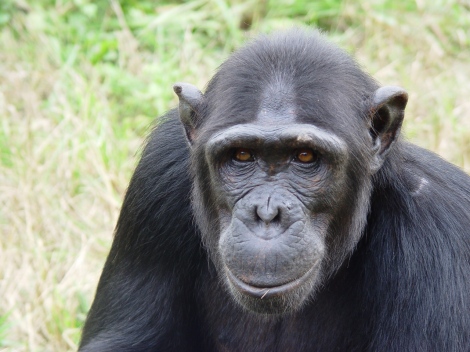When I was in Cameroon I had a chance to see first hand some of the challenges conservationists are currently facing. One of the biggest problems is trying to reintegrate individuals back into the wild to help ensure that wild populations remain vibrant, healthy, and diverse.
At Limbe Wildlife Centre, a conservation sanctuary in South-west Cameroon for orphaned great apes, there are several individuals who could be returned to their homes in the wild, if only conservationists knew their group of origin. Many of these great apes had been snatched from their natal groups as infants, to be trafficked overseas, sold as pets, or used for bushmeat. A smuggler can get up to US $20,000 on the international market, and up to US $100 in the local market in Cameroon. As dire as this situation is, recent research has indicated that genetics may help conservationists reintegrate these individuals.
Two different studies (e.g., Ghobrial et al. 2010; Bowden et al., 2012) analyzed genetic variation in chimpanzees and revealed that populations living close in proximity are actually more genetically diverse than human populations living on different continents. The reason for such great genetic diversity comes from the fact that there is more stability and less interbreeding on large time scales within chimpanzees, when compared to modern humans. From a conservationists perspective this has utilitarian value. Genetic tests could easily identify a population of origin for chimpanzees that have been removed from their homes!
But it gets better for conservationists. New research in genetics could help stop wild animal trafficking, hunting, and smuggling all together. By analyzing the genes of chimpanzees that have been smuggled, or sold on the black market as bush meat, conservationists will now be able to identify previously unknown “hunting hotspots”. By analyzing these hotspots conservationists should be able to inform governments and conservation organizations of areas that need protecting. They will also be able to identify protected areas that need better enforcement, and assess the best methods for successfully conserving great apes.
Over the past two years, these genetic tests have revealed that the country in need of fastest conservation reform is Cameroon. Cameroon is home to the rarest and most endangered subspecies of chimpanzee. This subspecies of chimpanzee is predicted to become extinct in 25 years if current rates of population decline continue. It is now evident that this decline is being primarily driven by the most elaborate and sophisticated smuggling and hunting network in Equatorial Africa.
Fortunately, genetic testing has now revealed just how severe the problem has become, and may be able to stop the trade dead in its tracks. Thanks to these tests, it seems likely that the chimpanzees and gorillas I was able to bond with at Limbe are going to be tested, and hopefully they will be able to return to their families in the wild. This is a great example of how an integrated scientific approach can inform 21st century conservation efforts, and give everyone who cares about the environment hope for a better tomorrow.
If you want to get involved or help care for an orphaned chimpanzee, you can always join Roots & Shoots or become a “chimp guardian” for an orphaned chimpanzee today!
References
Bowden, R., MacFie, T.S., Myers, S., Hellenthal, G., Nerrienet, E., et al. 2012. Genomic tools for evolution and conservation in the chimpanzee: Pan troglodytes ellioti is a genetically distinct population. PLoS Genetics, doi: 10.1371/journal.pgen.1002504
Ghobrial, L., Lankester, F., Kiyang, J.A., Akih, A.E., de Vries, S., Fotso, R., Gadsby, E.L., Jenkins, P.D. & Gonder, M.K. 2010. Tracing the origins of rescued chimpanzees reveals widespread chimpanzee hunting in Cameroon. BMC Ecology, 10:2, doi: 10.1186/1472-6785-10-2

Reblogged this on Cadell Last.
Pingback: Great Ape and Human Genetic Diversity | Change is in you·
Pingback: Conservation Answers In The Genes | The Advanced Apes·
Pingback: Conservation Answers In The Genes·